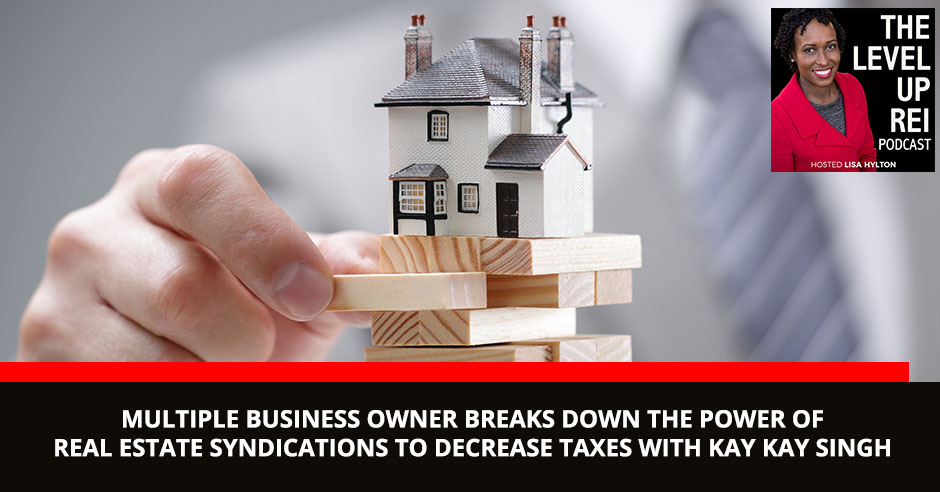
Good tax strategy can make or break your business. In this episode, Lisa Hylton’s guest talks about using real estate syndications to reduce tax overheads. Kay Kay Singh is the founder and CEO of Grow Rich Capital. An entrepreneur starting from childhood, Kay Kay has deep insights on managing business ventures. Sharpen your mind and grow rich in this episode with Kay Kay Singh and explore ways to ensure your business is prospering well how he made decisions in certain situations all throughout his ventures.
—
Watch the episode here
Listen to the podcast here
Multiple Business Owner Breaks Down The Power of Real Estate Syndications To Decrease Taxes With Kay Kay Singh
I have on the show with me Krishan “Kay Kay” Singh. Krishan is a Microsoft Certified Systems Engineer turned successful entrepreneur and multi-business owner owning multiple gas stations, convenience stores, two laundromats, a banquet hall, 40 single-family homes that he sold. They were located in the Northeast Indiana area. He’s an investor in 3,411 units as a limited partner and 1,338 units as a general partner in four states using multifamily syndications across the US. I’m excited to have you on the show. Welcome to the show, Kay Kay.
Thank you very much, Lisa, for having me on your show.
The best thing to do if you own real estate is to get cost segregation done and always think of something to reduce tax burden in your business. Share on XI love the fact that you’re an entrepreneur. For my readers, my show is broken into three parts. One gives a little bit of background, we’ll get into the meat of the episode and then close things down with the level of questions that I ask all my guests. To kick things off, can you share with us where in the US do you live?
I live in Fort Wayne, Indiana.
What do you and your family like to do for fun?
I like to go on vacations. I love computers, though but I like to go with my family for a vacation especially in Florida.
Lastly, in this round here, when did you become a full-time entrepreneur no longer working corporate jobs?
It was soon after I migrated from India back in 2000. I lost my computer job because of 9/11. I ended up in the gas station business accidentally because my friends had gas stations. At that time, it was less than a year I migrated from India. I had spent all the money that I brought. I didn’t want to go back so I ended up with the gas station job as a cashier.
This perfectly leads us right into this episode. I wanted to talk about with you the transition from a corporate employee to the mindset, the view on life to entrepreneur. It sounded like you started off as a cashier and then eventually bought your own gas stations?
I was an entrepreneur from childhood so I had my own business. I had never had a job before I migrated. That was the way for me to migrate to the United States. I had visited back in 1997 and then 1999. At that time, computer jobs were booming. I went back to India and did my computer study. I did the Microsoft certification and some other certifications as well. I came here as a Microsoft certified systems engineer but after losing my job, I had friends so they offered me to work at their gas stations. I ended up in the gas station business because I had my family to support. I was the only earning person in the family so I ended up as a gas station cashier.
These days you now own gas stations and laundromats. Can you talk about the decision to start buying businesses in that space?
One of my friends gave me a 30% partnership in the gas station after I lost my job. After working four months as a cashier at $5.15 an hour so he offered me a 30% share in the gas station. I started managing that gas station. After about six months, that also closed. It was a good business but there was only a little lease left. We were expecting that the owner will extend the lease but he didn’t so we had to shut down that business as well. After that, I decided to buy my own so that I don’t end up in the same situation again and again. I bought a gas station here in Fort Wayne with a partnership with my nephew and my cousin. That’s how I got into the gas station business as an owner.
Do you still own gas stations?
I do. I own eight gas stations as of now. After 2005, we were buying a gas station every year. Until 2012, we kept buying more and more gas stations, one gas station every year. I had friends and family who partnered with me on those ventures. I managed two of them. Each one of us managed two gas stations. In 2012, I decided to diversify into some other businesses as well because of the recession. I thought, “I need to diversify.” I built a laundromat from the ground up.
Was this before the single-family homes? Was the single-family home portfolio around this time too?
No. I never thought I was going to be in real estate ever. That was in 2015 when somebody offered me a portfolio of 40 single-family houses at our church. I had no clue what the rental business is how to manage those. I had no idea and never thought that I’m going to be in this business. I had never been in this kind of business, dealt with the tenants and fixing stuff and all that. We didn’t know much about this business too but the guy who was selling was 82 years old and wanted to get rid of the houses. He had sold them twice but the buyers couldn’t get financing. He chose me because he knew I was going to get financing and he gave me a pretty good sweet deal so we bought his portfolio of 40 single-family houses.
How long did you hold those for?
We held it for five years. I managed those myself. In five years, we 10X’d our money.
Some people would say that instead of selling them, they would hold them long-term. Can you talk about the decision to sell?
Yes. I could hold it for some more time because they were cashflowing very well but I was the one managing those. Maybe we had a hard time selling all of them together because people were approaching me to buy 10, 15 or 5 of them but I didn’t want to sell. I bought and sold them accidentally.
Can you talk about selling them accidentally? How did that happen?

Real Estate Syndications: Always have quarterly meetings with your accountant so that they can plan accordingly. It’s worth paying them for that time, rather than paying to the government.
There was a twenty-unit property in the same town where my houses were. I went there to bid for that. I was buying more and then somebody was competing with me and kept competing with me. My numbers ran out of gas because I had a limit that I’m going to go up to this point and walk away. He kept bidding against me and then somebody else came up and I stopped. He started bidding with the other guy, who bought those $10,000 more than I would. I stopped at $55,000. The guy bought at $65,000 a unit. When we were walking out, I asked this guy what was he thinking when he was bidding. I said, “My numbers didn’t work more than $55,000 a door and how are you bidding?”
He said, “My numbers work.” I said, “Okay, if your numbers work, why don’t you buy single-family houses from me?” He had a real estate lady with him. I found it later on that she was managing his houses. He had eleven houses in the same city so he was interested. He said, “Give me your card. I’ll get back to you.” I gave him my card. In the evening, he emailed me with a bunch of questions and wanted my financials and everything. I sent him what he asked for. The next morning, he sent me another big list. I emailed him back. I said, “This is my condition. I have given you enough information. If you want any more information, provide me with proof of funds and also, this is my price.” I’ve also asked for a Letter Of Intent, LOI. He sent me all those three things in the evening. I said, “Okay, I’ll sell it.” I got the asking price. They appraised exactly what I asked for so I decided to sell them.
Overnight, you went from having a portfolio of 40 something single families to then selling all of them. I want to get into the syndication part, which is a large part of your business now. Before I get into that, I wanted to touch back on the gas stations and laundromats. For my readers who are intrigued by your business in those different sectors, can you talk about some of the key aspects of running those businesses for someone who’s thinking about buying a gas station and then also for the laundromat?
The biggest difference between those businesses and real estate is that those are businesses. Real estate is an investment so that means you may buy a property in Texas. You can still have a property manager manage this but you can’t do this in the gas station business especially the way we ran. We had to be at the gas station every day. It’s a hands-on business. It’s a cash business. If you are not at the gas station, doing the paperwork, taking care of the customers and the employees every day, you won’t find your gas station if you go after a month. The employees will take it away. You got to make sure that your employees open in the morning. If the employees don’t, you got to open it yourself. It’s very hard work.
The laundromat is a little less intensive than a gas station but still, people have problems. You got to take care of the problems if somebody didn’t get a card. Our laundromat is card-operated. Everything is on the card. You put money on tariffs. It spits a prepaid card and then you operate it. Our laundromats are by our gas stations. They are unattended but they are by our gas station. If they have a problem, they walk to the gas station, tell them the problem. There’s a manager or somebody who will take care of them.
The fact that your laundromats are near to your gas station, was that intentional?
It was intentional.
Was that an idea that you saw from other gas stations in other communities? How did the idea come about?
When we bought this gas station, there was a laundromat about a block away from our gas station with those old, beaten-up machines. I used to work Saturdays and Sundays. People used to come to do laundry. They used to come and get quarters from me. They were always cursing about the machines, the problems they had and nobody was taking care of them. They were always cursing them. I found an opportunity. There was a lot just next to my gas station. It has been weakened for 5, 6, 10 years. We built it in 2012. We bought this gas station in 2001. It was sitting where people used to park cars. Nobody knew who owned it. I approached a broker and asked him if he can find the owner and buy this lot. He found the owner and brought the deal to me. I bought that property and then I built it from the ground up.
The way in which the whole business is puzzled together because of the opportunities that you see from the pain that people are having in that particular community and building from there. Moving into real estate syndications, can you talk a little bit about how you get started. Was this introduced to you?
When I bought this single-family portfolio, we bought it in June and I thought I was paying a lot of tax for the gas station and the laundromats. I will always be thinking of something to reduce my tax burden. I thought, “If we bought the real estate now, we won’t be paying any tax or very little tax,” but we ended up paying a lot more tax again. In six months, we made $70,000. We had to pay tax on it too. I have heard a lot that people who own real estate don’t pay any taxes. How do they do it? I started doing the search. I was also the owner of this single-family portfolio. I was doing my own research in BiggerPockets.
I found the syndication process. There is a syndication process and people invest with that and then they get minus K-1s and that’s how they write off their profits. I liked it. I found a syndicator here in Indianapolis. I had a meeting at the end. We had a fifteen minutes meeting because we were fifteen minutes late to the meeting. He had another meeting. After fifteen minutes, we were three of us. I had two of my partners and I wanted to do the same thing. They were a little scared that we don’t know much about it but I gave him a $50,000 check. I said, “I’m going to go start.” He had an offering that time in Dayton, Ohio.
I participated in that deal as an LP. After investing that money, I started learning because I’m a person who can’t learn without my money and let my money involve. I started learning. I did a lot of research after that. I’m a person who does a lot of research. I did a lot of research, read a lot of books. The sponsor that I invested with suggested a few books in our first meeting. I read all those books and learned about the syndication process, cost segregation, bonus step ECH and all that. After that, I invested in 5, 6 more deals in the next year.
For my business owners who are out there reading, the real estate syndications have indeed been able to help with the taxes.
After I started investing, the first year, I got a $38,000 K-1 loss. That was my first experience of how to write off your passive income with passive losses. That’s why in the next year that I invested in five more deals. Since then, I’ve been investing about $200,000 to $250,000 a year. We have started selling properties as well. We have sold three properties already that I was an LP on. We are under contract for one property that I’m a GP on.
Can you talk a little bit about when the property sells? A lot of people are always wondering about what’s going to happen from a tax perspective. What was your experience like when the property sold?
Extensive research is the key to deep learning to enrich your entrepreneurial mindset Share on XLet me give you an exact example of a property that I was an LP on. I invested $75,000 on this property in Lithuania, Georgia. I was getting the preferred return on that. I think it was a 7% preferred return. After 2.5 years, the sponsors decided to sell the property. In the very first year, I got $75,001 depreciation. I was able to write all of it off or maybe some of it off. I don’t know exactly because I had more losses as well. I carry over passive losses every year because now we know about the cost segregation. We have a banquet hall too. We got our banquet hall depreciated. We got our gas stations depreciated. We did the cost segregation on that. We have a lot of minus K-1s now. Every year, we carry over to the next year. Come back to that $75,000 so I depreciated that $75,000 in the very first year. I got $1 more than what I invested. After 2.5 years, when it was sold, I had to recapture some of it and pay the capital gains. I had K-1 losses already. I didn’t have to pay tax on anything, neither the capital gain nor I had to recapture the depreciation.
That’s why you should keep investing. It helps in terms of cutting down the losses.
Let me give you another example. Back in 2017, I bought a Tesla car in my company’s name. I took a 100% loan on it at a 1.49% interest rate. I’m going to be paying for it in six years. My payment for the car is about $2,000. I got to depreciate that car in the very first year.
That’s accountants helping you because your business purchased the car too. Advice you’d give to business owners who are exploding because you have businesses that aren’t doing very well in the COVID season but you also have a lot of businesses that have been doing amazing. From 2020 into 2021, they’re faced with lots of gains. They’re looking at a lot of taxes ahead. Advice you’d give to them as a fellow business owner.
The best thing if own the real estate, they can get cost segregation done on those as well. Even the single-family people, it used to be very expensive. It didn’t make much sense but nowadays they have software. You can buy software and do your cost segregation yourself on single-families as well. It’s like $400, $500. You can use that software to do cost segregation on the single-family. We didn’t do that because there was no software available then but nowadays they have. You can get the cost segregation done on your own as well or you can even ask your accountant.
Sometimes they have the software already. They’ll do it for you. They might charge you $500. If you get a cost segregation company, they’ll charge you $6,000, $7,000. It doesn’t make sense. It’s not viable to do that. I would suggest to them to do this if they have real estate and also if they don’t and they have the money, they can invest passively in other deals and get the K-1 losses in the 1st and 2nd years.
Anything else that I didn’t ask you but you felt would be good to share?

Real Estate Syndications: The biggest difference between those businesses and real estate is that those are businesses and then real estate is an investment.
One thing I did, which is my mistake I don’t want others to do, for several years since I had been in business I thought the accountant is your best friend. You don’t have to do anything. I have been with the same accountant for many years. I’m not saying that but accountants do only what you pay for. For several years, I thought I don’t have to do anything myself. I will let the accountant take care of everything. After I got into the real estate business, I realized that you must know everything about taxes and read books. There are several good books. By reading a few books, you will have great knowledge and then you can go back to your accountant and tell him, “Why can’t I get this? Why can’t I get this done? How can I get this done?” Always have quarterly meetings with your accountant. We didn’t have one for several years. Always have meetings so that they can plan accordingly. It’s worth paying them for that time rather than paying to the government.
Any key books come to mind that you would recommend now?
Anybody starting here, Think and Grow Rich by Napoleon Hill. This is the first book I read and it changed my mind. I’m reading it for the second time to sharpen my memory again but this is a good book. I named my company after this book as well.
This then brings me to the level-up questions that I ask all my guests. The first one is what are you grateful for in your life?
I’m grateful to my parents who gave me a good education back in India, which was very difficult at that time. I know how they spend money on me. I’m also grateful to God for giving me this opportunity and bringing me to this land of opportunities. We are living the American dream. It’s been many years since we have been here.
What has attributed to your success and continuous growth?
Several things, my family, friends and ambition. I have always been an ambitious person. I have always worked hard. The hard work and my honesty paid off. I have helped a lot of people succeed as well. I love doing that. I love sharing my success story with other people so that they can succeed too.
Lastly, what do you now know that you wish you knew at the beginning of your journey?
I wish I could have been in real estate since 2001. Though we own some gas station real estate, we didn’t know anything about this. I wish I had known about taxes several years ago that we paid to the government for years and years. Now we know and I’m trying to let other people know how to save money on taxes. You’re not stealing from the government or anything. The government is giving you an opportunity and that helps the economy of the nation as well.
Thank you, Kay Kay, for coming to the show. It’s such an awesome show. I appreciate it. If my readers want to learn more about you, what’s the best place they can go to learn more?

Real Estate Syndications: The whole business is like a puzzle together because of the opportunities that you see from the pain that people are having in a particular community and building from there.
They can go to GrowRichCapital.com and fill out the form or they can meet me on the Facebook group, 10X Multifamily Investment Group, where I have 6,000 members. We share a lot of knowledge, information, not just me. The great multifamily guys share their knowledge over there as well.
Thank you so much, Kay Kay. It’s been a pleasure.
Thank you very much, Lisa, for having me on your show.
You’re welcome.
Important links:
- Think and Grow Rich
- GrowRichCapital.com
- 10X Multifamily Investment Group – Facebook Group
About Kay Kay Singh
 A Microsoft Certified System Engineer turned into a successful entrepreneur and multi-business owner owning multiple Gas stations and convenience stores, two Laundromat, a Banquet Hall, 40 SFRs (Sold) in Northeast Indiana and an investor in 3411 units as LP and 1338 units as GP in 4 states, Multifamily syndicated deals at various locations in the US.
A Microsoft Certified System Engineer turned into a successful entrepreneur and multi-business owner owning multiple Gas stations and convenience stores, two Laundromat, a Banquet Hall, 40 SFRs (Sold) in Northeast Indiana and an investor in 3411 units as LP and 1338 units as GP in 4 states, Multifamily syndicated deals at various locations in the US.
Own various agricultural, commercial, and residential properties in India. Has 10+ years experience in India and 20+ years of business experience in the USA in various fields. Always seeking expansion opportunities. Always interested in new investment opportunities, networking, and partnering with like-minded entrepreneurs.
Love the show? Subscribe, rate, review, and share!
Join The Level Up REI Podcast Community today:

Recent Comments